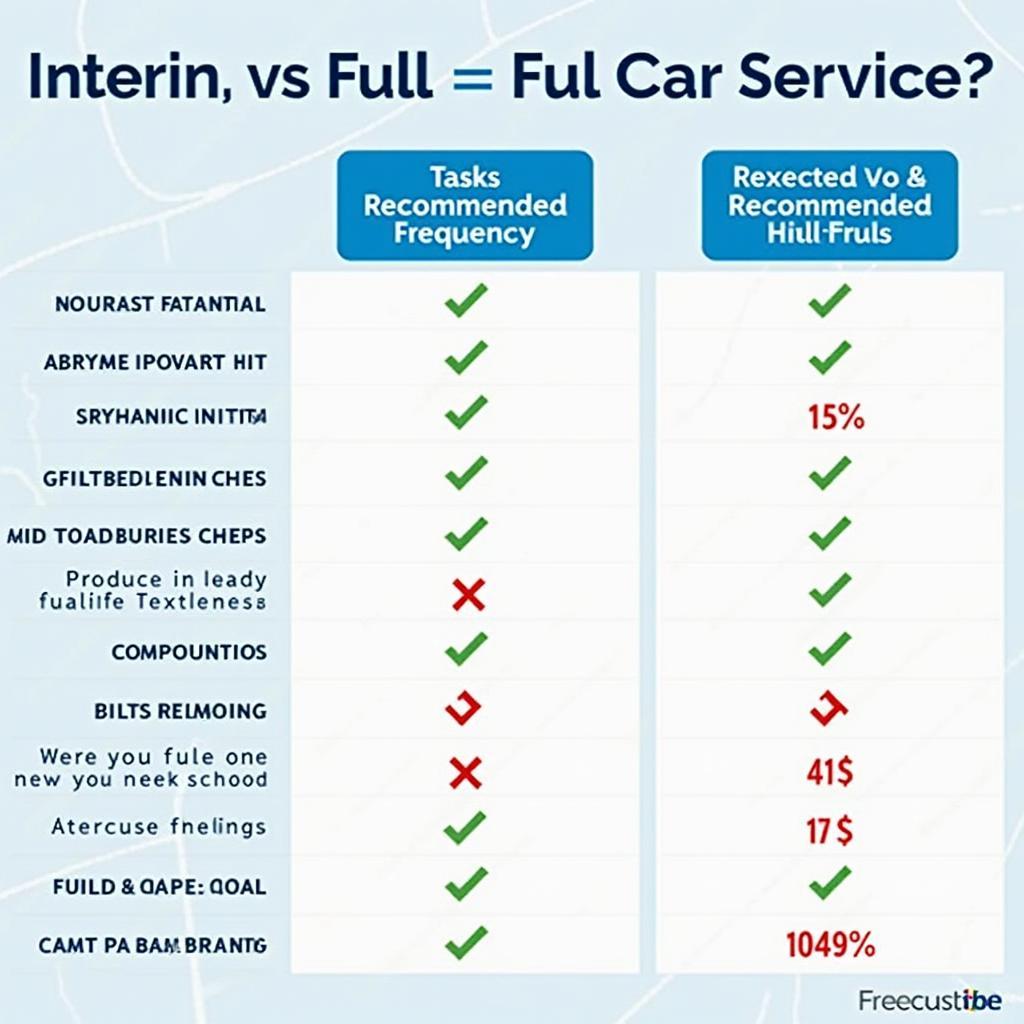Maintaining your car is essential for safety, performance, and longevity. But how often should you actually take it in for service? There’s no one-size-fits-all answer, as it depends on several factors like your car’s make and model, your driving habits, and the manufacturer’s recommendations. This article will help you navigate the complexities of car servicing and determine the optimal schedule for your vehicle.
Knowing when to service your car can save you money in the long run. Neglecting regular maintenance can lead to costly repairs down the road. A well-maintained vehicle also offers better fuel efficiency and a safer driving experience. You’ll find that understanding your car’s specific needs will help you plan for maintenance and avoid unexpected breakdowns. Curious about the cost of a full car service? Check out our article on what is the cost of a full car service.
Understanding Your Car’s Service Schedule
Every car comes with a recommended service schedule outlined in the owner’s manual. This schedule is typically based on mileage intervals, such as every 5,000, 7,500, or 10,000 miles. These intervals indicate when specific maintenance tasks should be performed, from oil changes and filter replacements to more complex procedures like spark plug replacements or timing belt checks.
The Importance of the Owner’s Manual
Your owner’s manual is your best guide for determining the ideal service schedule. It provides tailored recommendations based on your car’s specific design and engineering. While general guidelines exist, adhering to the manufacturer’s instructions ensures your vehicle receives the proper care at the right time. What is the first service like for a new car? Find out more on what is the first service of a new car.
Factors Influencing Service Frequency
Beyond the owner’s manual, several factors can influence how often you should have your car serviced.
Driving Conditions
Severe driving conditions, such as frequent stop-and-go traffic, extreme temperatures, or driving on rough terrain, can put extra strain on your vehicle’s components. If you regularly encounter these conditions, you may need to service your car more frequently than the standard schedule suggests.
Driving Habits
Aggressive driving, such as rapid acceleration and hard braking, can also accelerate wear and tear on your car. If you tend to drive aggressively, more frequent servicing might be necessary to keep your car in optimal condition.
Vehicle Age
Older vehicles generally require more frequent servicing than newer ones. As components age, they become more prone to wear and tear, making regular maintenance crucial for preventing breakdowns.
Different Types of Car Services
Car services typically fall into two categories: interim and full services.
Interim Service
An interim service is a less comprehensive check-up typically recommended every 6 months or 6,000 miles. It includes essential checks like oil and filter changes, brake inspections, and tire pressure adjustments. This service is crucial for maintaining your car’s basic functionality and preventing minor issues from escalating into major problems. Wondering about the cheapest car service options? Our article on which car service is cheapest can help.
Full Service
A full service is a more thorough inspection and maintenance procedure typically recommended annually or every 12,000 miles. It includes all the checks of an interim service, along with additional checks like spark plug replacement, coolant system inspection, and a comprehensive examination of all major components. A full service is essential for ensuring your car’s long-term health and reliability. Need to know if you need a service manual when selling your car? Check out is service manual needed while selling the car.
Signs Your Car Needs Servicing
Even with a regular service schedule, it’s important to be aware of signs that your car might need attention sooner than expected. These signs include:
- Unusual noises
- Warning lights on the dashboard
- Fluid leaks
- Decreased fuel efficiency
- Changes in handling or braking performance
If you notice any of these signs, it’s best to take your car to a qualified mechanic for inspection and diagnosis.
How Much Does Car Servicing Cost?
The cost of car servicing can vary significantly depending on the type of service, your car’s make and model, and the location of the service center. However, investing in regular maintenance is generally much cheaper than dealing with major repairs caused by neglect. For car service costs in India, you can refer to our article how much does a car service cost in india.
“Regular maintenance is an investment, not an expense. It’s the key to keeping your car running smoothly and avoiding costly surprises down the road,” says automotive expert, David Miller, ASE Certified Master Technician.
Conclusion
Knowing How Often Should You Have Your Car Serviced is crucial for its longevity, performance, and your safety. While the owner’s manual provides a baseline, factors like driving habits and conditions can influence the ideal frequency. Regular maintenance, coupled with attention to warning signs, ensures a safe and enjoyable driving experience while preventing costly repairs.
FAQ
- What happens if I skip a car service?
- Can I service my car myself?
- How do I choose a reputable car service center?
- What is included in a basic car service?
- How can I save money on car servicing?
- What is the difference between a service and an MOT?
- How long does a car service typically take?
“Preventive maintenance is always better than reactive repairs. By following a regular service schedule, you’re not just maintaining your car, you’re protecting your investment,” adds Sarah Chen, Lead Mechanic at AutoCare Solutions.
Need support? Contact us via WhatsApp: +1(641)206-8880, or Email: [email protected]. Our customer support team is available 24/7.


